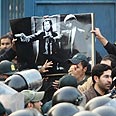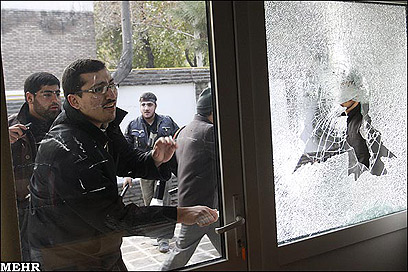
Britain is withdrawing some staff and dependents from its embassy in Tehran after it was stormed by Iranian protesters, some of whom tossed petrol bombs at the facility, the Foreign Office said Wednesday.
It declined to say how many people were being removed or give other details, but insisted that "ensuring the safety of our staff and their families is our immediate priority." Some diplomatic work is ongoing, though the embassy is officially closed.
Britain said it was outraged by the attacks and warned of "serious consequences". The UN Security Council condemned the attacks "in the strongest terms". US President Barack Obama called on Iran to hold those responsible to account.
Related stories:
- Iranian protesters storm British embassy compound
- UK warns Iran of 'serious consequences'
- Iran downgrades diplomatic ties with UK
Meanwhile, the speaker of Iran's parliament criticized the UN Security Council over its condemnation of the storming of the British embassy in Tehran and said the resolution, passed unanimously on Wednesday, put global security at risk.
"The hasty move in the Security Council in condemning the students' actions was done to cover up previous crimes of America and Britain while the police did all they could to keep the peace," Ali Larijani told parliament in an address broadcast live on state radio.
"This devious action will lead to instability in global security," he said.
On Tuesday, Iranian protesters stormed two British diplomatic compounds in Tehran, smashing windows, torching a car and burning the British flag in protest against new sanctions imposed by London.
The attacks occurred at a time of rising diplomatic tension between Iran and Western nations, which last week imposed fresh sanctions over Tehran's nuclear program that they believe is aimed at achieving the capability of making an atomic bomb.
Deepening infighting
Iran, the world's fifth biggest oil exporter, says it wants nuclear plants only for the generation of electricity.
The embassy storming was also a sign of deepening political infighting within Iran's ruling hardline elites, with the conservative-led parliament attempting to force the hand of President Mahmoud Ahmadinejad and expel the British ambassador.
"Radicals in Iran and in the West are always in favor of crisis ... Such radical hardliners in Iran will use the crisis to unite people and also to blame the crisis for the fading economy," said political analyst Hasan Sedghi.

Violence and looting in embassy compund (Photo: MEHR News)
Several dozen protesters broke away from a crowd of a few hundred outside the main British embassy compound in Tehran, scaled the gates, broke the locks and went inside.
Protesters pulled down the British flag, burned it and put up the Iranian flag, Iranian news agencies and news pictures showed. Inside, the demonstrators smashed windows of office and residential quarters and set a car ablaze, news pictures showed.
One took a framed picture of Queen Elizabeth, state TV showed. Others carried the royal crest out through the embassy gate as police stood by, pictures carried by the semi-official Fars news agency showed.
Situation 'confusing'
All embassy personnel were accounted for, a British diplomat told Reuters in Washington, saying Britain did not believe that any sensitive materials had been seized.
Demonstrators waved flags symbolizing martyrdom and held aloft portraits of Supreme Leader Ayatollah Ali Khamenei who has the final say on matters of state in Iran.

Violent protesters attack embassy (Photo: MEHR News)
Another group of protesters broke into a second British compound at Qolhak in north Tehran, the IRNA state news agency said. Once the embassy's summer quarters, the sprawling, tree-lined compound is now used to house diplomatic staff.
An Iranian report said six British embassy staff had been briefly held by the protesters. British Foreign Secretary William Hague said the situation had been "confusing" and that he would not have called them "hostages".
"Police freed the six people working for the British embassy in Qolhak garden," Iran's Fars news agency said.
A German school next to the Qolhak compound was also damaged, the German government said.
Police appeared to have cleared the demonstrators in front of the main embassy compound, but later clashed with protesters and fired tear gas to try to disperse them, Fars said. Protesters nevertheless entered the compound a second time, before once again leaving, it said.
British Prime Minister David Cameron chaired a meeting of the government crisis committee to discuss the attacks, which he said were "outrageous and indefensible".
"The failure of the Iranian government to defend British staff and property was a disgrace," he said in a statement.
"The Iranian government must recognize that there will be serious consequences for failing to protect our staff. We will consider what these measures should be in the coming days."
The United States, alongside the European Union and many of its member states also strongly condemned the attacks.
Also Wednesday, Norway announced that it has closed its embassy in Tehran due to security concerns.
Hilde Steinfeld, a Foreign Ministry spokeswoman in Oslo, said the decision to close the embassy was taken late Tuesday, but that Norway's diplomatic staff have not been evacuated from the country. "They're still in Tehran," she said.
Steinfeld would not go into greater detail, but said "the decision follows security concerns." She added that "it is in context with the attack on the British embassy yesterday."
There have been regular protests outside the British embassy over the years since the 1979 Islamic revolution that toppled the US-backed shah, but never have any been so violent.
The attacks and hostage-taking were a reminder of the 1979 takeover of the US embassy in Tehran carried out by radical students who held 52 Americans hostage for 444 days. The United States cut diplomatic ties with Iran after the hostage-taking.
Reuters, AP contributed to the report
- Follow Ynetnews on Facebook and Twitter
- Receive Ynetnews updates
directly to your desktop















